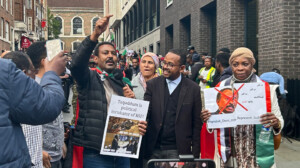Protests continue, roads blocked in Khartoum
Yesterday, protests which began on Monday continued in Khartoum and Wad Madani, calling for the course of the Sudanese revolution to be put back on track.
 Burning tyres on the main roads in Khartoum blocked raffic on August 20, 2020 (Social media)
Burning tyres on the main roads in Khartoum blocked raffic on August 20, 2020 (Social media)
Yesterday, protests which began on Monday continued in Khartoum and Wad Madani, calling for the course of the Sudanese revolution to be put back on track, threatening to call for the fall of the Hamdok government.
Members of Resistance Committees in Khartoum used barricades and burning tyres to block bridges and roads.
El Manshiya Bridge that links Khartoum with East Nile in Khartoum North, and roads in Abu Hamama, Jabra, Burri, Arkoweet and other neighbourhoods were blocked. In Omdurman, the street leading to the Libya Market was blocked. A number of streets in Wad Madani, capital of El Gezira, were also blocked.
El Soug El Arabi in downtown Khartoum witnessed demonstrations calling for a return to the principles of the revolution.
The protesters have demanded restructuring the Forces for Freedom and Change coalition which formed the backbone of the December revolution, completion of ongoing peace negotiations the formation of a Peace Commission, an economic conference, and more recognition of the deterioration of people’s livelihoods. This is in addition to previous demands, including the restructuring of the regular armed forces and for all companies to be placed under control of the Ministry of Finance.
According to reports, they will continue their protests until their demands are met. If not, Resistance Committees announced in a statement on August 17 that they will call for the fall of the transitional government of PM Abdallah Hamdok.
March of the Millions
On August 17, the day which marks the one-year anniversary of the signing of the Constitutional Declaration, many people were injured in clashes with police, and at least 77 demonstrators were detained as thousands took to the streets in Khartoum and a number of towns and cities across Sudan.
At the Council of Ministers, demonstrators called on Prime Minister Hamdok to personally receive their memo and refused to hand it over to any of his office representatives. They were told the PM was not available.
The Sudanese Professionals Association (SPA) condemned the violence used by the police on Monday, and also denounced the decision by the prime minister to send an employee to receive the memorandum in his stead.
The SPA warned that the options for escalation are open following provocations and encroachment by the security forces. The association said these will be announced after agreeing on the steps through the Resistance Committees Coordination.
The new civilian governor of Khartoum state, Ayman Khalid, and the Sudan Doctors Central Committee also condemned the violent dispersal of Monday’s demonstration.
On Wednesday, Khalid met with representatives of the protest. He pledged to dismiss the locality director and the heads of administrative units, along with other officials related to the former regime of Omar Al Bashir. A committee will be formed that will remove corrupt locality officials within two weeks. He said he would dismiss the Karari locality director within 24 hours.
The governor further ordered the replacement of the waste management officer in order to improve sanitation. This will coincide with the formation of a committee to investigate regular water and power outages.
Radio Dabanga’s editorial independence means that we can continue to provide factual updates about political developments to Sudanese and international actors, educate people about how to avoid outbreaks of infectious diseases, and provide a window to the world for those in all corners of Sudan. Support Radio Dabanga for as little as €2.50, the equivalent of a cup of coffee.












 and then
and then